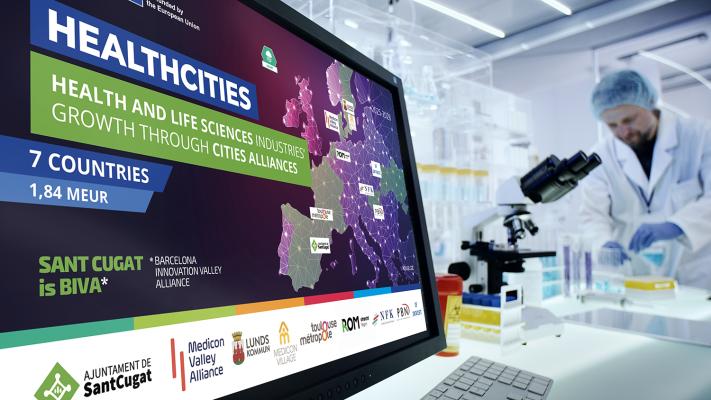Project summary
HEALTH CITIES is an alliance of European cities committed to enhancing the quality of life & their economies by maximizing the potential of the fast-growing, high-value-added LSH industry, which integrates agents involved in R&D & manufacturing of pharma, biotechnology, medical devices, biomedical technologies, etc. & emphasizes technology & innovation as crucial elements for improving quality of life.
Europe spends an estimated €1400bn/year on healthcare, with a life science industry turnover of €425bn. Around 9.5M people are employed in healthcare & 840k in LS. It is witnessing unprecedented innovation in the Life Sciences & Health (LSH) industry driven by technologies like data, AI & bio-revolutions. Cities with strong university-industry collaboration (3-helix) excel in supporting R&D investments in living organisms, but new governance models incorporating more key agents (6-helix) are needed.
Additionally, founders in the LSH face unique challenges: most have academic backgrounds with limited business skills, longer product development timelines & a heavily regulated environment affecting budgets & timelines.
To support them, a clear, long-term vision for competitiveness is necessary. As increasingly important actors in delivering policies to support innovation & entrepreneurship, small & medium-sized cities are in a unique position to introduce new models to connect the skills, knowledge, resources, entrepreneurial & innovative capacities of the stakeholders within the local & regional value chains.
HEALTH CITIES enhances 6 PIs influencing LSH, combining front-runners & followers, thus contributing to mitigating regional disparities, as pursued by the Cohesion Policy. By engaging in interregional exchange of experience, capacity building (integration of Good Practices (GPs)) & assessing the effectiveness of the implemented changes, it tackles 3 key areas: LSH ecosystem governance, supporting services to start-ups/SMEs & strategies to attract & retain talent
The aim of HEALTH CITIES is to improve the policy instruments from small European cities aiming at setting up local innovative and collaborative ecosystems to support start-ups, entrepreneurs and SMEs from the life sciences & health industries.
Three main areas of interest are highlighted:
1. Governance and concertation models between public and private actors at local and regional level, exploiting synergies and complementarities to strengthen the life sciences & health value chains;
2. Design and delivery of services and programmes to support the development and growth of start-ups and SMEs in the targeted industry;
3. Developing support programmes for talent attraction and retention in small cities.
